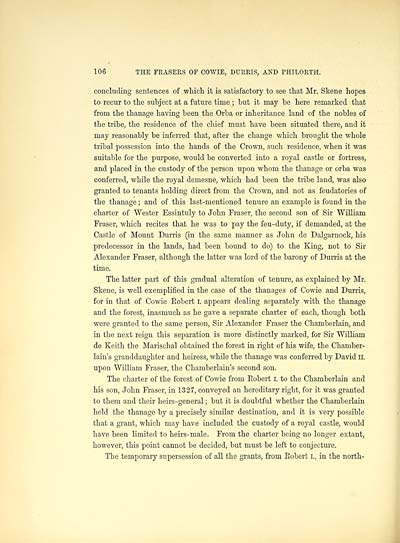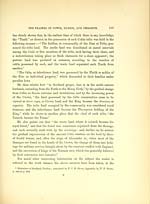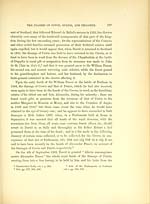Frasers of Philorth > Volume 1
(138)
Download files
Complete book:
Individual page:
Thumbnail gallery: Grid view | List view

106 THE FEASEES OF COWIE, DUBEIS, AND PHILOETH.
concluding sentences of which it is satisfactory to see that Mr. Skene hopes
to recur to the suhject at a future time ; but it may be here remarked that
from the thanage having been the Orba or inheritance land of the nobles of
the tribe, the residence of the chief must have been situated there, and it
may reasonably be inferred that, after the change which brought the whole
tribal possession into the hands of the Crown, such residence, when it was
suitable for the purpose, would be converted into a royal castle or fortress,
and placed in the custody of the person upon whom the thanage or orba was
conferred, while the royal demesne, which had been the tribe land, was also
granted to tenants holding direct from the Crown, and not as feudatories of
the thanage ; and of this last-mentioned tenure an example is found in the
charter of Wester Essintuly to John Fraser, the second son of Sir William
Eraser, which recites that he was to pay the feu-duty, if demanded, at the
Castle of Mount Durris (in the same manner as John de Dalgarnock, his
predecessor in the lands, had been bound to do) to the King, not to Sir
Alexander Fraser, although the latter was lord of the barony of Durris at the
time.
The latter part of this gradual alteration of tenure, as explained by Mr.
Skene, is well exemplified in the case of the thanages of Cowie and Durris,
for in that of Cowie Eobert I. appears dealing separately with the thanage
and the forest, inasmuch as he gave a separate charter of each, though both
were granted to the same person, Sir Alexander Fraser the Chamberlain, and
in the next reign this separation is more distinctly marked, for Sir William
de Keith the Marischal obtained the forest in right of his wife, the Chamber-
lain's granddaughter and heiress, while the thanage was conferred by David II.
upon William Fraser, the Chamberlain's second son.
The charter of the forest of Cowie from Eobert I. to the Chamberlain and
his son, John Fraser, in 1327, conveyed an hereditary right, for it was granted
to them and their heirs-general ; but it is doubtful whether the Chamberlain
held the thanage by a precisely similar destination, and it is very possible
that a grant, which may have included the custody of a royal castle, would
have been limited to heirs-male. From the charter being no longer extant,
however, this point cannot be decided, but must be left to conjecture.
The temporary supersession of all the grants, from Eobert I., in the north-
concluding sentences of which it is satisfactory to see that Mr. Skene hopes
to recur to the suhject at a future time ; but it may be here remarked that
from the thanage having been the Orba or inheritance land of the nobles of
the tribe, the residence of the chief must have been situated there, and it
may reasonably be inferred that, after the change which brought the whole
tribal possession into the hands of the Crown, such residence, when it was
suitable for the purpose, would be converted into a royal castle or fortress,
and placed in the custody of the person upon whom the thanage or orba was
conferred, while the royal demesne, which had been the tribe land, was also
granted to tenants holding direct from the Crown, and not as feudatories of
the thanage ; and of this last-mentioned tenure an example is found in the
charter of Wester Essintuly to John Fraser, the second son of Sir William
Eraser, which recites that he was to pay the feu-duty, if demanded, at the
Castle of Mount Durris (in the same manner as John de Dalgarnock, his
predecessor in the lands, had been bound to do) to the King, not to Sir
Alexander Fraser, although the latter was lord of the barony of Durris at the
time.
The latter part of this gradual alteration of tenure, as explained by Mr.
Skene, is well exemplified in the case of the thanages of Cowie and Durris,
for in that of Cowie Eobert I. appears dealing separately with the thanage
and the forest, inasmuch as he gave a separate charter of each, though both
were granted to the same person, Sir Alexander Fraser the Chamberlain, and
in the next reign this separation is more distinctly marked, for Sir William
de Keith the Marischal obtained the forest in right of his wife, the Chamber-
lain's granddaughter and heiress, while the thanage was conferred by David II.
upon William Fraser, the Chamberlain's second son.
The charter of the forest of Cowie from Eobert I. to the Chamberlain and
his son, John Fraser, in 1327, conveyed an hereditary right, for it was granted
to them and their heirs-general ; but it is doubtful whether the Chamberlain
held the thanage by a precisely similar destination, and it is very possible
that a grant, which may have included the custody of a royal castle, would
have been limited to heirs-male. From the charter being no longer extant,
however, this point cannot be decided, but must be left to conjecture.
The temporary supersession of all the grants, from Eobert I., in the north-
Set display mode to:
![]() Universal Viewer |
Universal Viewer | ![]() Mirador |
Large image | Transcription
Mirador |
Large image | Transcription
Images and transcriptions on this page, including medium image downloads, may be used under the Creative Commons Attribution 4.0 International Licence unless otherwise stated. ![]()
| Histories of Scottish families > Frasers of Philorth > Volume 1 > (138) |
|---|
| Permanent URL | https://digital.nls.uk/96567156 |
|---|
| Attribution and copyright: |
|
|---|
| Description | A selection of almost 400 printed items relating to the history of Scottish families, mostly dating from the 19th and early 20th centuries. Includes memoirs, genealogies and clan histories, with a few produced by emigrant families. The earliest family history goes back to AD 916. |
|---|

